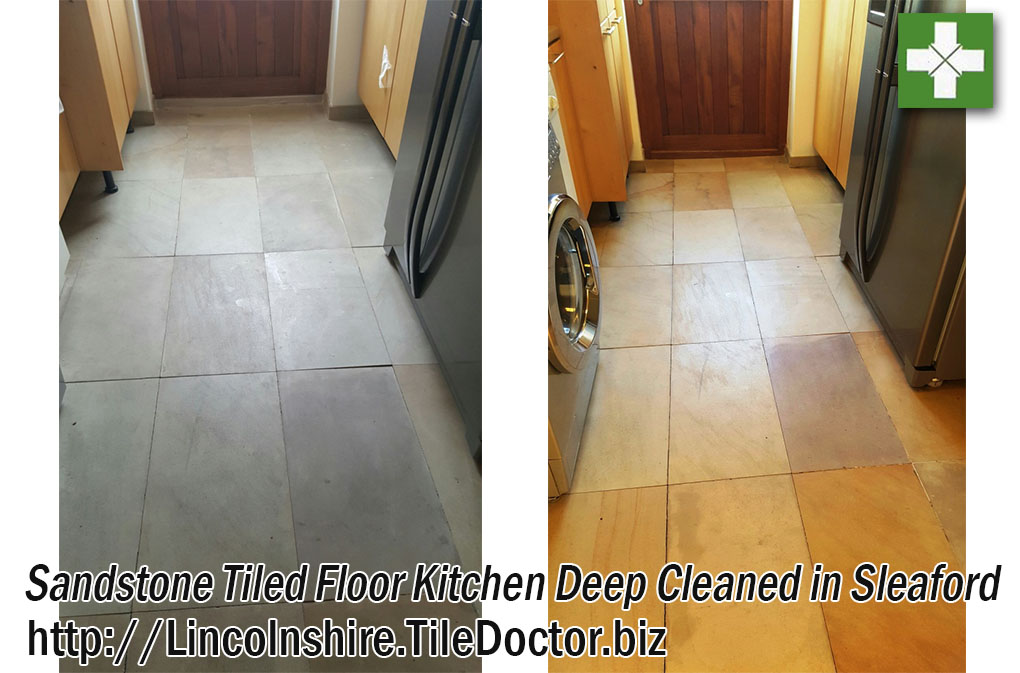I can’t stress how important a sealer is when it comes to maintaining the look of a stone floor and although they can protect a floor for many years if not maintained they will all but disappear in high traffic areas allowing dirt and stains to penetrate the pores of the stone. This gradual degradation occurs over such a long period it usually happens without being noticed.
This Sandstone tiled kitchen floor and entrance hall at a barn conversion property in Sleaford had not been sealed in eight years. Since Sandstone is naturally highly porous, dirt and staining had easily become easily ingrained in the tiles. The result? A very dull and poor looking set of tiles.
 |
 |
After difficulties trying to resolve the situation by themselves, the property owners asked me to deep clean the tiles to restore the appearance of the Sandstone which had faded over the years. Thankfully we have the right products, equipment, and experience to be able to carry out the restoration quickly and efficiently.
Cleaning a Dull and Dirty Sandstone Tiled Floor
The first day of work involved preparing the area by protecting other surfaces and removing the kickboards form under the kitchen units. This was followed by a deep clean of the floor firstly with our high pressure Rotovac system which applies hot water under high pressure to force out ingrained dirt and muck from the stone whilst simultaneously extracting the soil back to a tank on our van. I followed this by scrubbing and rinsing the tiles and grout with a solution of Tile Doctor Pro-Clean, a high alkaline powerful cleaner we use on natural stone floors. This helped to tackle any particularly deeply ingrained dirt and clean up the grout.
 |
 |
Following the clean, I installed turbo dryers and used the already in-built underfloor heating to dry the Sandstone, which was necessary as it is naturally a very porous stone and easily absorbs moisture.

Sealing a Sandstone Tiled Floor
On the second day, the tiles were completely dry and ready to be sealed however before sealing I asked for the underfloor heating to be switched off so the fresh sealer would cure more naturally. To seal the floor, I opted to use Tile Doctor Colour Grow which is an impregnating sealer that occupies the pores in the Sandstone so dirt can’t, additionally it’s formulated to enhance the naturally occurring colours in the Sandstone – those which after such a long time the customer was keen to see again.
 After two coats of Colour Grow were applied, the transformation was well and truly complete. The customer was also well and truly happy. After eight years, the Sandstone tiles were restored to better than their original condition.
After two coats of Colour Grow were applied, the transformation was well and truly complete. The customer was also well and truly happy. After eight years, the Sandstone tiles were restored to better than their original condition.
 One question I often get asked is how do you know when your sealer has worn down. The answer is to conduct a water test on your tiles, if the water forms a bubble on the surface of the tile as in the photo below then it shows the sealer is doing its job.
One question I often get asked is how do you know when your sealer has worn down. The answer is to conduct a water test on your tiles, if the water forms a bubble on the surface of the tile as in the photo below then it shows the sealer is doing its job.



Sealers protect your floor from staining and enhance the look of the stone, however they do wear down over time depending on floor traffic and what products are used to clean the floor (don’t use anything even mildly acidic) and this is when dirt can become ingrained in the stone, so if you do want to keep your floor looking its best talk to Tile Doctor their regular maintenance service that will ensure your sealer is kept topped up.